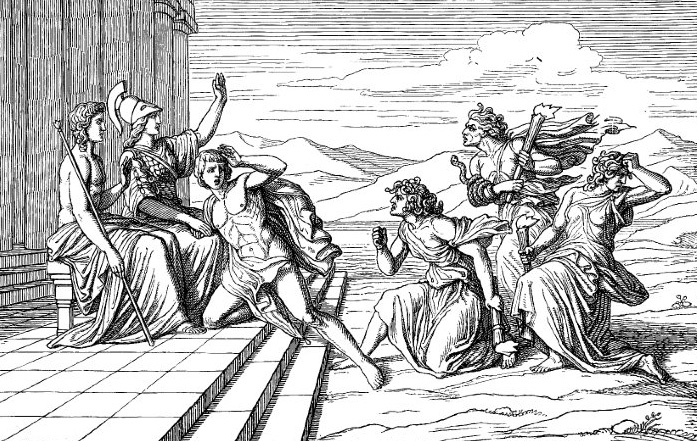Much of Western culture is heavily influenced by the ancient Greeks and Romans. However, we have this way of idealizing the past and forgetting the bad, while still maintaining the negative influences in our culture. It’s as if we managed to throw the bathwater without the baby but completely forgot about the diapers. Greek democracy was not a true democracy. Women, slaves, and even some freemen were not allowed to participate. We don’t get to pick and choose what we inherit from history; it’s up to us to take critical looks at our culture and its influences to weed out the sources of inequality.
Although much of ancient literature was lost with the burning of the library at Alexandria, a surviving Greek tragedy is Aeschylus’ Oresteia. In this trilogy of plays, the Queen of Mycenae, Clytemnestra, kills her husband Agamemnon when he comes back from the Trojan war. To solidify her position, she banishes her young son, Orestes, so that he will not challenge her for the throne. When he is a grown man, Orestes goes back home to avenge his father. Before she is killed, Clytemnestra curses Orestes for matricide and the Furies (ancient goddesses of justice) descend upon him to avenge her. Orestes begs the Gods for assistance, so Athena hosts the first ever trial to decide who is in the right: Orestes for avenging his father, or Clytemnestra/the furies for avenging matricide. A jury of peers vote, and it is a tie, so Athena casts the tie-breaking vote. She says that since she is borne of Zeus and has no mother, mothers have done nothing for her and cast her vote for Orestes. The furies are granted a new place in the pantheon, and Orestes is free to live his life.
I spend a lot of time thinking about Athena choosing Orestes’ side. To me, Clytemnestra’s motivations make sense. She killed her husband in cold blood – but Agamemnon was a horrible husband who sacrificed their daughter for “favorable winds” at sea and then left for ten years to fight a ridiculous war. Meanwhile, Clytemnestra was left to run the kingdom, and by all accounts, she was a great ruler – maybe even better than Agamemnon. She had just spent ten years as close to a free woman as is possible. Clytemnestra was a fierce and strong woman who had a choice to make: kill her husband and continue to rule or return to her subservient position.
From a modern perspective, Athena siding with Orestes doesn’t make sense. However, this play was written by someone who lived in a world where women were second-class citizens. Athena sides with Orestes because she was written by an ancient Greek man who probably didn’t care about the female perspective in his play. Her justifications made sense to the author and the intended audience of the play.
So what do we learn from Clytemnestra and a problematic Athena? It’s easy to dismiss a life you haven’t lived. Although a woman, Athena is a goddess and doesn’t relate to Clytemnestra. She can’t understand Clytemnestra because the people who wrote her couldn’t. If she did, she probably would have sided with the furies. Sometimes I have to remind myself that with my privilege I am like Athena. As a straight, white, middle-class, and educated woman, my experience is very different from other women. I have the ethical imperative to learn from Athena and be better. To remember that just because I can’t always empathize, I can still listen and sympathize. More importantly, I can support my fellow women. We all have people in our lives who we have a difficult time understanding, taking a step back and being conscientious of the fact that we haven’t lived their life is incredibly helpful for understanding and compassion.
We also learn that just like the Oresteia is a product of greek culture, the industry we work in is a product of western culture. It’s important to see these patterns and systems because that is what needs to change. Individual victories are important (and often the beginning of systematic change), but making a productive and positive difference for all happens with systematic cultural change. Everything from altering the language of employee handbooks to be gender neutral, to educating employees about what sexual harassment is, helps to change the culture. Clytemnestra wouldn’t have been driven to kill her husband if she had been given an equal opportunity to rule.
We have to remember to keep the baby, but throw out the bathwater and the diapers. To be conscientious about how we see the past and not idealize it, and to hold ourselves to a higher standard. We need to take critical looks at influences on the industry. Where do we see the past influences of misogyny, patriarchy, and other forms of injustice? How can we remove these injustices so that everyone is given equal opportunity? Where are we Athena, and need to come down to earth and try to understand a life that is different from our own? The Ancients did a lot of good – now we need to make it our own. A place where Clytemnestra can rule, Athena is more understanding, and with hopefully a lot less murder.
As always, work hard, do your best, and make yourself proud.
 Tia Azimioara interest in live sound engineering began while studying the clarinet at the Orange County High School of the Arts, where she took a class on music technology. She would go on to double major in Anthropology and Classics at Lawrence University while working as a sound tech. She googled and YouTubed her way through shows and concerts. She fell in love with the fast-paced, trial by fire world of live production. After graduating she began working any live events that she could. After two years she has completely fallen in love with her varied and fast-paced life; today you can find her doing anything from slinging deck at a concert venue in Doc Martens, to working in IT specialist for a corporate event in a suit. She is not sure what the future holds but would like to use her training in anthropology to help make the industry more inclusive for everyone.
Tia Azimioara interest in live sound engineering began while studying the clarinet at the Orange County High School of the Arts, where she took a class on music technology. She would go on to double major in Anthropology and Classics at Lawrence University while working as a sound tech. She googled and YouTubed her way through shows and concerts. She fell in love with the fast-paced, trial by fire world of live production. After graduating she began working any live events that she could. After two years she has completely fallen in love with her varied and fast-paced life; today you can find her doing anything from slinging deck at a concert venue in Doc Martens, to working in IT specialist for a corporate event in a suit. She is not sure what the future holds but would like to use her training in anthropology to help make the industry more inclusive for everyone.
